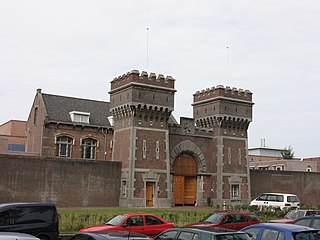Related Research Articles

The International Criminal Court (ICC) is an intergovernmental organization and international tribunal seated in The Hague, Netherlands. It is the first and only permanent international court with jurisdiction to prosecute individuals for the international crimes of genocide, crimes against humanity, war crimes, and the crime of aggression. The ICC is distinct from the International Court of Justice, an organ of the United Nations that hears disputes between states. Established in 2002 pursuant to the multilateral Rome Statute, the ICC is considered by its proponents to be a major step toward justice, and an innovation in international law and human rights.

Timbuktu is an ancient city in Mali, situated 20 kilometres north of the Niger River. It is the capital of the Tombouctou Region, one of the eight administrative regions of Mali, having a population of 32,460 in the 2018 census.

The Hague Convention for the Protection of Cultural Property in the Event of Armed Conflict is the first international treaty that focuses exclusively on the protection of cultural property in armed conflict. It was signed at The Hague, Netherlands, on 14 May 1954 and entered into force on 7 August 1956. As of July 2021, it has been ratified by 133 states.

The International Criminal Court has opened investigations in Afghanistan, Bangladesh/Myanmar, Burundi, the Central African Republic (twice), Côte d'Ivoire, Darfur in Sudan, the Democratic Republic of the Congo, Georgia, Kenya, Libya, Mali, Palestine, the Philippines, Uganda, Ukraine, and Venezuela I. The Office of the Prosecutor carried out and closed preliminary investigations in Bolivia; Colombia; Congo II; Gabon; Guinea; Honduras; Iraq/the United Kingdom; registered vessels of Comoros, Greece, and Cambodia; and South Korea. Ongoing preliminary examinations are being carried out in situations in Lithuania/Belarus, Nigeria, and Venezuela II.

The Sidi Yahya Mosque, also known as the Mosque of Muhammad-n-Allah, is a mosque and madrasa of Timbuktu in Mali. The construction of the mosque began in 1400 under the leadership of Sheikh el-Mokhtar Hamalla of Timbuktu and was finished in 1440.

People detained by the International Criminal Court (ICC) are held in the ICC's detention centre, which is located within a Dutch prison in Scheveningen, The Hague. The ICC was established in 2002 as a permanent tribunal to prosecute individuals for genocide, crimes against humanity, war crimes, and the crime of aggression. As of June 2018, it has issued public arrest warrants for 42 individuals, six of whom are currently in custody of the court.

Cuno Jakob Tarfusser was an Italian judge of the International Criminal Court (ICC).
An Agreement on the Enforcement of Sentences with the International Criminal Court is a formal agreement whereby a state agrees to carry out a sentence imposed by the Court. Article 103 of the Rome Statute of the International Criminal Court states that a "sentence of imprisonment shall be served in a State designated by the Court from a list of States which have indicated to the Court their willingness to accept sentenced persons." To this end, the Court has concluded Agreements with a number of states that have declared their willingness to accept sentenced persons.

Joyce Aluoch is a Kenyan lawyer who served as Judge of the International Criminal Court from 2009 until 2018. She is a former judge of the High Court of Kenya. In addition to her career as a judge, she was the First Chairperson of the Committee of African Union Experts on the Rights and Welfare of the Child and the Vice-Chairperson of the United Nations Committee on the Rights of the Child from 2003 to 2009. She has also served as the inaugural head of the family division of the Kenyan High Court and a member of the Court of Appeal.

The National Movement for the Liberation of Azawad or the Azawad National Liberation Movement, formerly the National Movement of Azawad, was a militant organization based in northern Mali.

Ansar Dine, meaning "helpers of the religion" (Islam) and also known as Ansar al-Din, was a Salafi jihadist group led by Iyad Ag Ghaly. Ansar Dine sought to impose absolute sharia across Mali. The group took over the city of Timbuktu in 2012, which prompted the French-led intervention, Operation Serval.
Iyad Ag Ghaly, also known as Abū al-Faḍl, is a Tuareg Islamist militant from Mali's Kidal Region. He has been active in Tuareg rebellions against the Malian government since the 1980s – particularly in the early 1990s. In 1988, he founded the Popular Movement for the Liberation of Azawad. In the latest episode of the Tuareg upheavals in 2012, he featured as the founder and leader of the Islamist militant group Ansar Dine.
Sidi Mahmoud Ben Amar was a revered Muslim scholar who is one of the 333 Sufi saints said to be buried in Timbuktu. The tomb of Sidi Mahmoud Ben Amar is among 16 cemeteries and mausolea that are a part of Timbuktu, which is classified as a UNESCO World Heritage Site. On 30 June 2012, it was reported that his tomb had been destroyed by Ansar Dine following the Battle of Gao, as it contravened sharia according to Ansar Dine. These attacks resemble those carried out by the Wahabist movement on the Arabian peninsula during the late 18th century.

The Battle of Gao was fought between the National Movement for the Liberation of Azawad (MNLA) and the Islamist Movement for Oneness and Jihad in West Africa (MOJWA), along with its ally Ansar Dine, in Gao between 26–28 June 2012. By the 28 June, Gao, Timbuktu and Kidal, the three biggest cities in the disputed secessionist region of Azawad within what is recognised as Malian territory, were under the control of Ansar Dine and its Islamist allies.

The International Criminal Court investigation in Mali or the Situation in the Republic of Mali is an ongoing investigation by the International Criminal Court (ICC) into war crimes and other crimes within the ICC's jurisdiction that are alleged to have occurred during the Northern Mali conflict since January 2012. The investigation was requested by the government of Mali in July 2012. As the first person who pleaded guilty to a charge of the ICC, Ahmad al-Faqi al-Mahdi made a statement expressing remorse and advising others not to commit similar acts.

The United Nations Detention Unit (UNDU) is a UN-administered jail. It is part of the Hague Penitentiary Institution's Scheveningen location, more popularly known as Scheveningen Prison, in The Hague, Netherlands. The UNDU was established in 1993 as part of the International Criminal Tribunal for the former Yugoslavia (ICTY) and currently houses detainees whose cases have been taken over by the International Residual Mechanism for Criminal Tribunals (IRMCT).
The Fall of Timbuktu took place during the war in northern Mali. It was one of the first clashes between the MNLA and Ansar Dine, and led to the latter taking control of the city in June 2012.
Al-Hassan Ag Abdoul Aziz Ag Mohamed Ag Mahmoud is a Malian Islamist militant and convicted war criminal who joined Ansar Dine in early 2012 and became an interpreter and administrator of the Islamic police in Timbuktu during the Northern Mali conflict. Al-Hassan was tried in the International Criminal Court on the charges of crimes against humanity and war crimes carried out during 2012 and 2013, including rape and sexual slavery under Article 8 2.(e)(vi) of the Rome Statute of the ICC. He was convicted on 26 June 2024 of some of the war crimes and crimes against humanity charges, including torture, mutilation and cruel treatment. He was acquitted of the rape and sexual slavery charges.
Mohamed Lemine Ould El Hassen, nom de guerre Abdallah al-Chinguetti, was a Mauritanian jihadist and commander of Katiba Al Furqan of the Al-Qaeda in the Islamic Maghreb.
References
- ↑ "Emerging Voices: A Case of Firsts for the International Criminal Court: Destruction of Cultural Heritage as a War Crime, Islamic Extremism and a Guilty Plea". Opinio Juris. 2016-08-09. Retrieved 2020-12-23.
- ↑ "Al-Mahdi Case (The Prosecutor v. Ahmad Al Faqi Al Mahdi)". International Criminal Court.
- ↑ "Nine Years for the Cultural Destruction of Timbuktu". The Atlantic. 27 September 2016.
- 1 2 3 Ahmad al-Faqi al-Mahdi: The vandal of Timbuktu, BBC News (September 27, 2016).
- ↑ "AHMAD AL-FAQI AL-MAHDI". Trial International. 27 September 2016.
- 1 2 3 4 "Situation in Mali: Ahmad Al Faqi Al Mahdi surrendered to the ICC on charges of war crimes regarding the destruction of historical and religious monuments in Timbuktu". International Criminal Court. 2015-09-26. Archived from the original on 2015-09-27. Retrieved 2015-09-26.
- ↑ "ICC Prosecutor Fatou Bensouda on the Malian State referral of the situation in Mali since January 2012". www.icc-cpi.int. Retrieved 2020-12-23.
- ↑ "ICC Prosecutor opens investigation into war crimes in Mali: "The legal requirements have been met. We will investigate"". International Criminal Court. 2013-01-16. Archived from the original on 2013-01-20. Retrieved 2015-09-26.
- ↑ "Case Information Sheet: Situation in the Republic of Mali, The Prosecutor v. Ahmad Al Faqi Al Mahdi" Archived 2016-08-03 at the Wayback Machine , icc-cpi.int, June 2016.
- ↑ Calamur, Krishnadev (2016-08-22). "Repenting for the Cultural Destruction of Timbuktu". The Atlantic . Retrieved 2016-08-22.
- ↑ The Prosecutor v Ahmad Al Faqi Al Mahdi (Reparations Order) ICC01/12-01/15 (17 August 2017).
- ↑ "Al-Mahdi Case (The Prosecutor v. Ahmad Al Faqi Al Mahdi)". International Criminal Court.